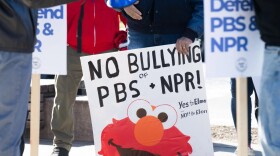Legislation to cut funding to hundreds of NPR and PBS member stations is heading to the U.S. House of Representatives for a final vote.
Indiana’s Senators Todd Young and Jim Banks voted along with most of their Republican colleagues early Thursday to claw back two years of funding for the Corporation for Public Broadcasting along with previously allocated money for other agencies.
Banks and Young are both critics of NPR for what they perceive as its liberal bias.
Neither senator responded to requests for comment Thursday. Nor did Bloomington’s Republican representative in the U.S. House, Erin Houchin. Last month, Houchin voted in favor of a similar version of the rescission bill.
Defunding public media is a key priority for President Donald Trump. He threatened to withhold support for GOP lawmakers if they failed to back the rescission effort.
Ahead of the vote Wednesday night, Sen. Banks posted a video of storm clouds over the national mall along with the text: “Rescissions are coming.”
Just took this video from the speakers balcony https://t.co/OzizunDWjb
— Jim Banks (@Jim_Banks) July 17, 2025
He also retweeted another user’s post saying that "NPR listeners are gonna have to choose: Groceries from Whole Foods or an NPR donation.”
In a statement, PBS president and CEO Paula Kerger called the cuts “devastating.”
“These cuts will significantly impact all of our stations, but will be especially devastating to smaller stations and those serving large rural areas. Many of our stations which provide access to free unique local programming and emergency alerts will now be forced to make hard decisions in the weeks and months ahead,” she said.
Kerger’s counterpart at NPR, Katherine Maher, noted in a separate statement that 3-in-4 Americans say they rely on public radio for alerts and news about public safety.
The U.S. House now has “one more opportunity to protect the local, independent public radio stations by rejecting this rescission,” Maher said.
It’s unclear exactly how the cuts, if finalized, will impact public media in Indiana.
Federal money makes up about 11 percent of combined funding for WFIU and WTIU, according to a 2024 audit. The share is higher for others in the 17-station network of Indiana NPR and PBS stations, particularly those serving rural areas.
Indiana NPR and PBS stations already lost all state funding earlier this year. That amounted to about 4 percent of the combined budget for the Bloomington stations, which laid off one part-time videographer at the end of the fiscal year.
Last week, a statewide team of public media journalists, including one based at WFIU/WTIU, learned their positions are likely to be eliminated as stations pull back on spending.
WFIU/WTIU’s interim executive director Jay Kincaid declined to comment ahead of the U.S. House vote, set for Thursday or Friday.




